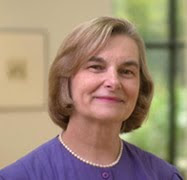Am still not reflecting here on days 4, 5, and 6 of our dual narrative tour, but I want to think about yesterday--Sunday. The day after the mass shooting at the Tree of Life synagogue in Pittsburgh in which eleven people were killed by a madman--including one holocaust survivor. The same week a dozen or more individuals who have spoken out critically of Trump and his hate rhetoric received pipe bombs in the mail.
Going to St George’s Episcopal Cathedral service yesterday morning was a balm for the troubled soul. The priest welcomed the congregation at 8:00 and we prayed through the liturgy, listened to the timely readings from the Book of Job, the Letter of Paul to the Hebrews, and the Gospel of Mark, heard the words of a sermon spoken from the heart and gathered around to share bread broken and wine poured.
I cannot describe the sensation of hearing the words of the Gospel. "They came to Jericho . . ." It was the story of the blind Bartimaeus who asked Jesus, in response to His question "What do you want me to do for you?"--"My teacher, make me see again." So we struggle to see, and not only to see but to make sense of what we see and the often conflicting narratives that we hear.
As we waited for more than 2 hours in a line in the Church of the Nativity we lived in the midst of the conflict of Christian sects whose turf wars about who can do what in the place of Jesus’ birth seemed such a paradox in the birthplace of the Prince of Peace. From the cognitive dissonance of Bethlehem, we drove on the bus to Hebron--words fail to capture the depth and breadth of the conflict in this place whose name I think has its roots in where friends gather. Dominated by settlers who were described as so zealous that they have become a law unto themselves. In a place so holy where the patriarchs and matriarchs of the three religions of the Abrahamic tradition are laid to rest, Hebron and the Tomb of the Patriarchs is probably more divisive than most places in this land. Indicative of the division was the way our guides had to get off the bus or off the street and take circuitous routes to reconnect with our tour group.
We saw the Main Street of Hebron mostly closed with storefronts welded shut and bolted. Margie took us through the Jewish side of the Tomb and then walked with us down the Main Street to the check point. She had to stay back while we crossed to meet Husam and walk back on the parallel street, the Palestinian side. It was a sight and slice of life in the occupied city. More to come. Off to a political tour of Jerusalem--visiting the wall and the man responsible for the "implementation."
Just returned from the political tour of Jerusalem where we got off the bus at two different locations and drove through a number of neighborhoods to see in the city of Jerusalem the impact of what our speaker called "the fence" --except for the urban areas where it was essential to construct a 9 meter high barricade of concrete topped with barbed wire.
But I want to go back to our walk through Hebron and one specific incident. While walking through the Palestinian parallel main street, one of the first areas we encountered was the chicken market. Caged chickens are everywhere. It is not pleasant to walk through as you might imagine. When we passed by the place where the birds are "processed" so each shopper can take home the evening’s dinner to cook, Husam pointed out the de-feathering machine. This was familiar to me from my days on the farm when each Friday in the summer we would butcher 50-100 organically raised chickens and deliver them to people in town. My job was to take the pin feathers left after the birds had been whirled around in the de-feathering machine: a tub that was an old agitator washing machine fitted with rubber finger-like projections that would remove the feathers and leave the birds pretty much naked. Husam mentioned that they call this machine "ma’atah"--and it is the same name they give the similarly constructed turnstiles that are part of the check points that Palestinians must so often pass through--one in a series of steps that does to their souls what the "ma’atah" does to the chickens. Shortly after that, most of us on the tour bus elected to get off the bus and walk through the check point at Hebron that thousands of Palestinians are required to do each day. They line up at 4:00 in the morning in tunnels that are barely lighted and often wait for hours to "be processed." Already heavy with the sadness of walking through the streets of Hebron, my heart ached. I am in great awe of the lack of bitterness that accompanies a complete frankness in both Husam and Morgie whose guidance and wisdom have opened our eyes and ears, as well as our minds and hearts.








